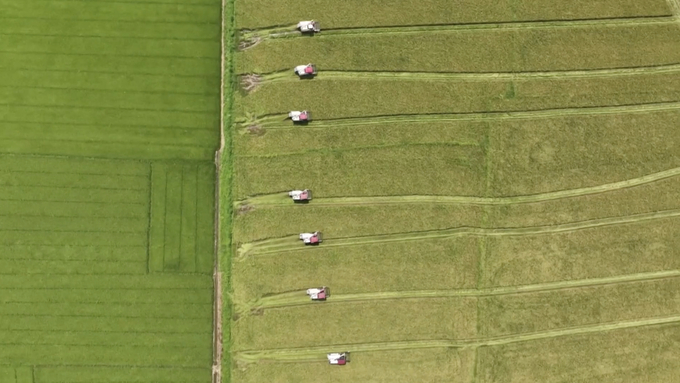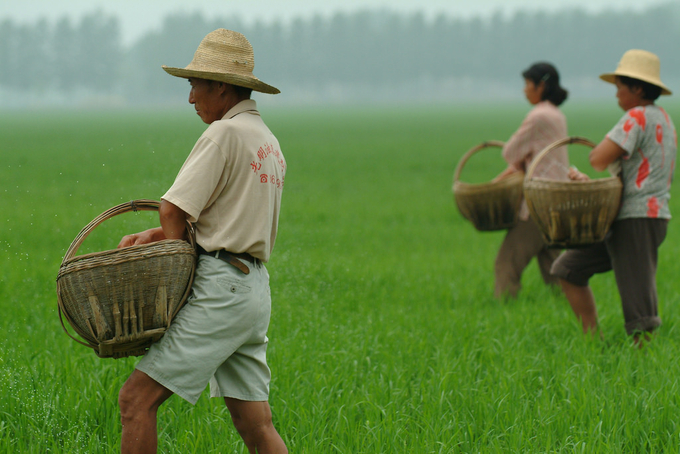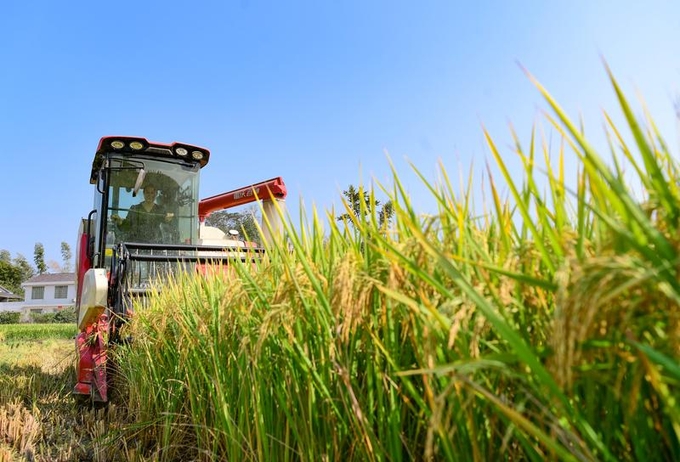May 21, 2025 | 12:08 GMT +7
May 21, 2025 | 12:08 GMT +7
Hotline: 0913.378.918
May 21, 2025 | 12:08 GMT +7
Hotline: 0913.378.918

China sees highly mechanized harvesting of early rice. Photo: China Global Television Network.
Rice production plays a crucial role in China’s agricultural landscape, and is a staple food for over 60% of the population. The FAO-GEF Project, “Innovative Transformation of China’s Food Production Systems and Agro-Ecological Landscapes towards Sustainability,” aims to address these challenges by promoting integrated management of agro-ecosystems, technological innovation, extending the value chain of agricultural products, developing eco-compensation incentive mechanisms, and fostering partnerships among stakeholders.
Targeting wheat, maize, and rice, the project is expected to restore 80,000 hectares of land, implement improved practices across 450,000 hectares of landscapes, and mitigate 6,000,000 tons of CO₂ equivalent, directly benefiting 250,000 individuals, half of whom are women.
Despite these efforts, achieving stable rice production and supply while managing GHG emissions presents complex challenges. Effective CH₄ emission reduction is technically demanding without reducing the sown area or compromising yield stability and growth. Initiatives aimed at increasing rice yield often lead to higher CH₄ emissions, while emission reduction measures can pose risks to crop yield. Balancing emissions reduction with production increase, and aligning agricultural production with ecological and environmental benefits, is a critical challenge in the context of CH₄ reduction in rice fields.
Another significant challenge lies in the economic viability of rice production. The small scale of rice planting, combined with high production costs and additional expenses associated with new technology applications and farmland improvements, creates financial strain on farmers. Moreover, technical barriers hinder the widespread adoption of sustainable practices, such as the limited use of organic fertilizers or biochar in certain regions. This is compounded by a disparity between the promotion of abatement technologies and the fragmented nature of small and family farming, as well as the diverse types of rice cultivation.
The scarcity of young, energetic labor in rural areas exacerbates these issues, as a substantial number of rice paddies are situated in mountainous, hilly, and plateau regions, often in small plots that are not conducive to the adoption of emission reduction technologies. Addressing these challenges requires coordinated efforts to enhance technological resources, support cost-saving and income-increasing strategies for farmers, and develop innovative solutions to stabilize rice production while effectively managing GHG emissions.

China lacks young labor in rural areas. Photo: IRRI.
Millions of smallholder farmers operate in diverse climatic and geographical regions, creating a complex landscape for implementing uniform emission reduction strategies. The substantial regional variations in climate, soil type, and farming practices mean that the effectiveness and suitability of CH4 emission reduction technologies can differ widely across regions. As such, these technologies must be carefully evaluated for their applicability, operability, and impact based on local conditions, which poses a challenge for large-scale promotion due to the complexity and variability of the technologies involved.
Moreover, there is a considerable gap in farmers’ knowledge and awareness regarding sustainable practices. This underscores the need for effective dissemination of information and technical training to increase the acceptance and adoption of new technologies and farming methods.
However, this is complicated by the absence of an established agro-ecological compensation mechanism or an incentive system for emission reduction. Additionally, China lacks a comprehensive monitoring, reporting, and verification (MRV) system for agricultural carbon emissions, which is crucial for tracking progress and ensuring compliance with emission reduction targets.
The implementation of certain CH₄ emission reduction technologies often requires additional investments, which can further dampen farmers’ willingness and enthusiasm to adopt them. Without adequate incentives and support systems, farmers may be reluctant to embrace practices that, while beneficial for the environment, add to their operational costs.
Overcoming these challenges will require not only technological innovation but also the development of supportive policies and mechanisms that align farmers' economic interests with environmental goals, ensuring that the pursuit of sustainable rice production is both viable and attractive to the millions of smallholder farmers across China.
To effectively incentivize farmers to participate in low-emission rice programs, it is crucial to provide robust policy support, promote technological innovation, and highlight successful case studies. China has set a strong example with its comprehensive policy framework aimed at reducing agricultural emissions, including those from rice cultivation.
The 14th Five-Year Plan emphasizes green development, while the Technical Guidelines for Green Agricultural Development (2018-2030) and the National Sustainable Agricultural Development Plan (2015-2030) lay the groundwork for sustainable practices.
Additionally, the National Overall Plan for the Construction of High-Standard Farmland (2021-2030) and the 14th Five-Year National Agricultural Green Development Plan further solidify the nation’s commitment to transforming its agricultural landscape. Notably, the Implementation Plan for Agricultural and Rural Emission Reduction and Carbon Sequestration outlines specific measures to reduce emissions and enhance carbon sequestration, thereby supporting the adoption of environmentally friendly practices by farmers.

Rice farming in China is highly mechanized. Photo: China Daily.
Technological innovation is another critical component of reducing emissions in rice cultivation. Practices such as rice paddy mulching and crop rotation, including methods like rice and legume rotation, help to minimize methane and nitrogen oxide emissions while improving soil structure and fertility. The use of alternate wetting and drying (AWD) irrigation significantly reduces methane emissions by alternating between flooding and draining the paddies.
Furthermore, the application of organic fertilizers and biochar, instead of chemical fertilizers, helps to reduce nitrogen oxide emissions, improve soil health, and enhance carbon sequestration. Precision agriculture techniques, which leverage technologies such as satellite remote sensing, unmanned aircraft, and sensors, allow for precise field management. This includes optimized fertilization, irrigation, and pest control, leading to reduced GHG emissions from excessive fertilizer and irrigation use.
A successful case study that demonstrates the benefits of these approaches is the Direct Seeding of Rice Planting Model in Kunshan City, Jiangsu Province. Since its implementation, the project has demonstrated the effectiveness of dry-direct seeding, which not only reduced the planting cost and methane emissions but also maintained rice yields.
This model exemplifies how sustainable practices can lead to economic benefits for farmers while contributing to environmental goals. Encouraging farmers to adopt these innovative practices through policy support, access to technology, and showcasing successful models can drive the transition to low-emission rice cultivation, ensuring both environmental sustainability and economic viability.

(VAN) Attempts to bring down the price of the Japanese staple have had little effect amid a cost-of-living crisis.

(VAN) Fourth most important food crop in peril as Latin America and Caribbean suffer from slow-onset climate disaster.

(VAN) Shifting market dynamics and the noise around new legislation has propelled Trouw Nutrition’s research around early life nutrition in poultry. Today, it continues to be a key area of research.

(VAN) India is concerned about its food security and the livelihoods of its farmers if more US food imports are allowed.

(VAN) FAO's Director-General emphasises the need to work together to transform agrifood systems.

(VAN) Europe is facing its worst outbreak of foot-and-mouth since the start of the century.

(VAN) The central authorities, in early April, released a 10-year plan for rural vitalization.